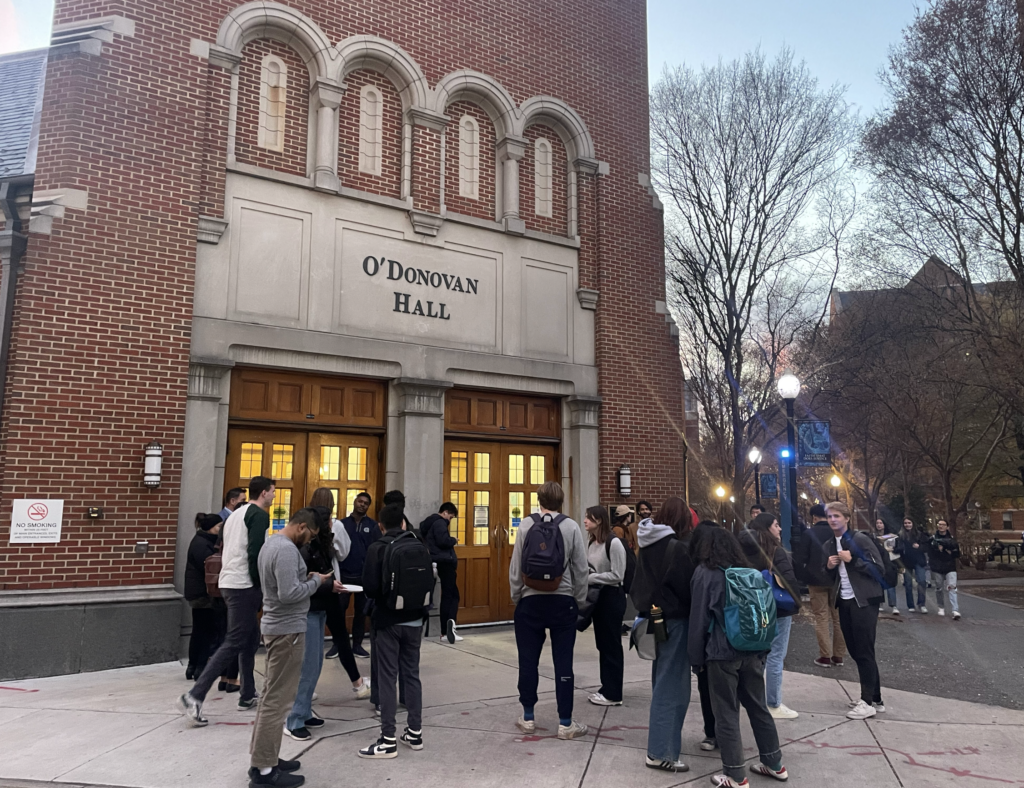Georgetown University dining workers discussed their demands for upcoming contract negotiations at a Nov. 28 panel hosted by the Georgetown Coalition for Workers’ Rights (GCWR), a student group dedicated to protecting workers’ rights on campus.
At the event, five employees from Leo J. O’Donovan Dining Hall spoke to raise concerns about their current working conditions, particularly a lack of adequate leave or pay during the holidays. They also discussed rebuilding their connections with the Georgetown community following the COVID-19 pandemic through student-employee engagement and interactions with their coworkers.
Although campus facilities workers negotiated a new contract last summer, dining workers have not negotiated their contract since 2019. The current contract expires at the end of this year, so dining workers plan to bring post-pandemic demands to negotiations.

Kathy, one of the dining workers on the panel, said she wants negotiations to focus on the language of the new contract.
The Hoya has omitted these panelists’ last names from publication to protect their privacy.
“One of the main things that I would really want to see is the language changed because, as it reads now, if you’re on leave of absence — which is when we close for Christmas or close for the summer — you’re not eligible to get paid for the holidays,” Kathy said at the event.
Gloria, another panelist, said the workers could not prevent loopholes when negotiating for sick days and paid time off (PTO) with their first contract.
“Originally, with our first contract, we had PTO and vacation,” Gloria said. “What they did — they changed the PTO to sick days and added a couple of days, and that was it. So we actually didn’t win. We won to have sick days, but they turned it around and took the PTO away.”
Parking has also become an increasingly relevant issue. Dining workers were temporarily offered free parking during the pandemic, but that offer no longer applies. Now, they must pay $25 a day for parking, if unable to obtain one of the limited monthly parking passes for $167.
Kathy said the university’s construction projects, such as the new Henle Village, and an expanding campus have exacerbated this issue by decreasing the number of parking spots available for dining workers.
“Because campus has grown so much, they don’t have a lot of space allotted for cafeteria workers because of the construction workers and the students, but they do have spots available, if you’re one of the lucky ones,” Kathy said. “If you get it, it’s more affordable to pay for it monthly than daily.”
Dining workers are employed by Aramark, the university’s primary dining contractor, under Georgetown’s Just Employment Policy. This policy is designed to ensure fair compensation for employees and full-time contract workers. As of Sept. 12, 2023, their minimum total compensation requirement is $19.76 per hour.
Aramark’s hourly workers at Georgetown are also represented by the UNITE HERE union.
A university spokesperson said Georgetown is committed to ensuring that contractors like Aramark comply with the Just Employment Policy.
“Georgetown University is committed to ensuring workers are treated fairly under our Just Employment Policy and works with contractors like Aramark on campus to ensure compliance with the policy, which requires contractors to provide a greater total compensation package than called for by existing metro-area wage ordinances,” the spokesperson wrote to The Hoya.
Despite the university’s policy, Josh Gavsie (CAS ’24), president of GCWR, said the actual conditions of the workplace are determined by management from Aramark.
“The university can put pressure on Aramark in the contract negotiation, but unlike, say, the facilities staff who are directly hired by the university, we don’t negotiate with Georgetown throughout this process. We negotiate with Aramark,” Gavsie told The Hoya. “The university is more of a middle party here than a direct ally on either side.”
The panelists also discussed how managers have violated their contract. According to Kathy, a common violation involves not properly compensating a worker for performing a higher-paid job like a line attendant for cooking.
“If they’re taking you out of your classification and it’s a higher-paid classification, they have to pay you for doing the higher-paying job. So you have to really watch them,” Kathy said.
Kathy said the workers continue to appreciate student support as contract negotiations begin.
“I think unity is the best thing,” Kathy said. “We’ve had demonstrations, and the kids will be there eating. And they’ll see us walking and chanting, and they’re walking and chanting with us. It was really, really something to see — we walk, you walk. We chant, you chant.”





















